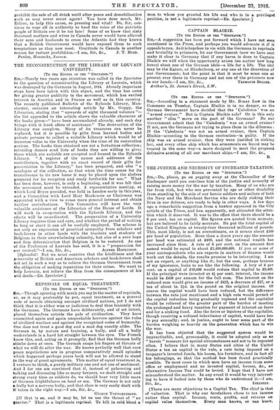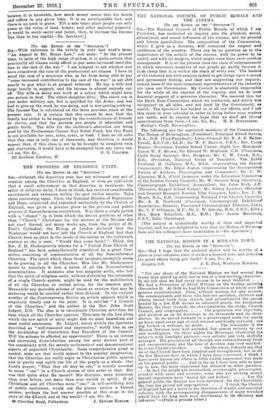THE JUSTICE AND NECESSITY OF INCREASED TAXATION. [To THE EDITOR
OF THE " SPECTATOR.") Sus,—Do, please, go on pegging away at the Chancellor of the Exchequer until you convince him of the justice and necessity of raising more money for the war by taxation. Many of us who are far from rich, but who are prevented by age or other disability from standing by the side of our heroic soldiers and sailors of both the Navy and the Merchant Service who are daily risking their lives in our defence, are ready to help in other ways. A few days ago a remarkable suggestion from a banker appeared in the City
article of the Times, and has, apparently, not attracted the atten- tion which it deserved. It was to the effect that there should be a 6 per cent. tax on capital. His figures are quoted from memory, but are believed to be fairly accurate. He put the total capital of the United Kingdom at twenty-four thousand millions of pounds. This, most likely, is not an overestimate, as it means about £500 per head of population. More than a dozen years ago the amount per head was estimated at £400, and the national wealth has increased since then. A rate of 6 per cent. on the amount first named would be equal to about £1,400,000,000. If you or some of your correspondents who are experts in matters of finance would work out the details, the results promise to be interesting. I am not an expert, or anything like it; but the case, perhaps because of my ignorance, looks to me like the following. A levy of 6 per cent. on a capital of £10,000 would reduce that capital to £9,400. If the principal were invested at 4} per cent. interest, the income would be £450 per annum for the full sum. The interest on the reduced sum would give an income of £423, a decrease of £27, or a tax of about is. 21d. in the pound on the original income. Of course the capital would have been reduced, but the difference between the rate just mentioned and a high rate would permit of the capital reduction being gradually replaced and the capitalist would be relieved of the greater part of the burden of meeting the prolonged and heavy taxation for payment of interest on loans and for a sinking fund. Also the heirs or legatees of the capitalist, though receiving a reduced inheritance of capital, would have less to pay annually; and, in justice, ought to bear some part of the burden weighing so heavily on the generation which has to win the war.
It has been objected that the suggested system would be impracticable, and, presumably, it could be adopted only as an " heroic " measure for special circumstances and not to be repeated often. I believe that in many States and cities of the United States a tax on capital is the rule, a rate being imposed on a taxpayer's invested funds, his house, his furniture, and in fact all his belongings, so that the method has been found practically possible. To meet cases in which men have an income from some office or employment and no invested capital, houses, &c., an alternative Income Tax could be levied. I hope that I have not misunderstood the matter. In any event it would be very interest- ing to have it looked into by those who do understand it.—I am, [There are many objections to a Capital Tax. The chief is that of .valuation. That is why our forefathers chose to tax income rather than capital. Income, rents, profits, and returns on capital value themselves. Every man knows, or can know,
because it is knowable, how much money comes into his hands and coffers in any given time. It is an ascertainable fact, and there is no need to guess. Till a sale takes place people can only guess at the value of land, houses, and other material property. It would be much easier and juster, then, to increase the Income Tax than to tax capital.—ED. Spectator.]



































 Previous page
Previous page